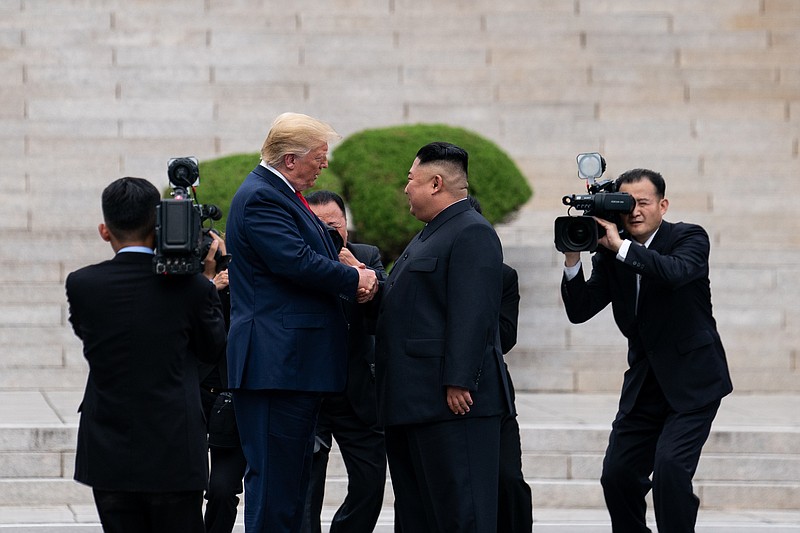WASHINGTON - In dealing with North Korea's Chairman Kim Jong Un, President Trump should remember that he is a snake handler, not a snake charmer.
The baseline: Kim is a modernizing autocrat who believes his survival will be enhanced by the economic development he wants, in addition to the nuclear weapons he has. If he has decided to resume negotiations, it's to remove sanctions, put his economy in overdrive and, maybe, keep some of his nuclear arsenal. It's not because he has a "great relationship" with Trump but because he's a rational, if cocky, dictator.
This caution doesn't diminish the importance of what Trump achieved last Sunday in stage-managing his reality-diplomacy show at the Korean Demilitarized Zone. This was a high-risk photo opportunity, but when Trump became the first U.S. president to step into North Korea, he reopened a path to denuclearization and normalization of relations.
Trump's many bad qualities shouldn't blind us to this good achievement. The question is whether this is a real turn toward peace and stability in Asia, as opposed to a survival gambit for Kim and a re-election campaign stunt for Trump.
What were the precursors of this reopening? First, Kim apparently concluded he had erred at the Hanoi summit in February in expecting that he could get sanctions relief without making any real concessions on denuclearization. He began walking back this mistake in May.
A clear public sign that Kim wanted to play ball again came in a June 4 Foreign Ministry statement reaffirming North Korea's "will to cherish and implement in good faith" the denuclearization pledge Kim made at the Singapore summit in June 2018. The statement urged that "both sides give up their unilateral demands and find a constructive solution."
A shadow play commenced: Kim sent Trump what the president called a "beautiful letter" last month, and Trump responded in kind. Stephen Biegun, the State Department's special representative for North Korea, said June 19 at the Atlantic Council that the "door is wide open" for renewed negotiations and that the only big obstacle was the lack of an "agreed definition of what denuclearization is."
The State Department quietly announced on June 24 that Biegun was traveling to Seoul. And then, on Saturday, came Trump's seemingly off-the-wall tweet: "If Chairman Kim of North Korea sees this, I would meet him at the Border/DMZ just to shake his hand and say Hello(?)!" A day later, they were shaking hands and Trump was walking across the border.
Here's what to watch carefully in the weeks ahead. Since this diplomatic dance began, the question has been what specific, verifiable steps North Korea will take toward the declared goal of denuclearization. Kim tried to sidestep that in Hanoi by offering to dismantle one big nuclear facility at Yongbyon, which Trump rightly rejected because the U.S. knows there are other facilities outside the boundary of this compound. Are those other facilities now on the table? Is the U.S. willing to consider a transitional "freeze" of Pyongyang's activities?
Trump, wisely, seems to have accepted that denuclearization won't be an immediate disarmament but a gradual, monitored process. He said Sunday that "speed is not the object. We want to see if we can do a really comprehensive, good deal." That's the right goal.
The personal factor in diplomacy is ephemeral but real. China may have been ready for an opening to America in 1972, but it took President Richard Nixon to go to Beijing. Egypt may have been primed for peace with Israel in 1978, but it took President Jimmy Carter to negotiate the Camp David Accords with Anwar Sadat and Menachem Begin.
Kim and Trump make an unattractive pair, in many respects. But if for their own reasons they're ready to begin a serious denuclearization discussion, so much the better.
Washington Post Writers Group
